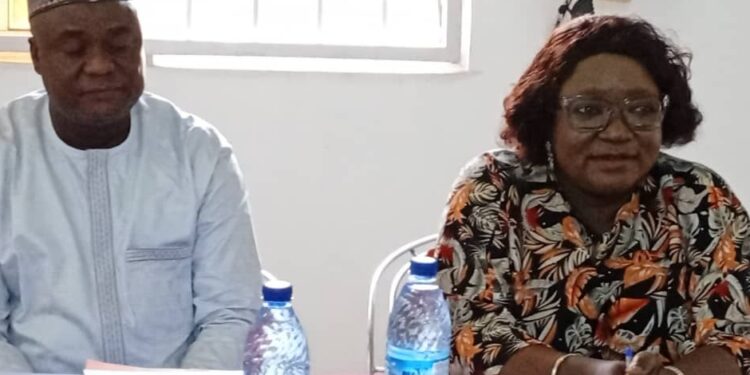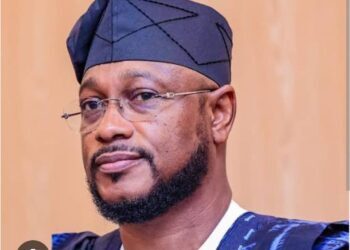By Solomon Attah,Lafia
The Nasarawa State Bureau of Statistics, has expressed its willingness to partner the United Nations Children’s Fund (UNICEF), to conduct Households Social Economic Survey to reduce the rate of poverty and other related factors possibly affecting the growth of children in the state.
The Bureau is also seeking the support of UNICEF to access grants that will help the state expand its operational capacity, as well as enhance its quality of data collected across sectors of the state.
Dr. Ahmed Ibrahim, the Statistician General of the state, stated this while playing host to Gerida Birukila, the Field Officer, Kaduna Field Office of the UNICEF in Lafia, the state capital.
The Statistician General, who reelout mandates of the Bureau said, he is determined to enhance the capacity of its staff for “comprehensive data collection, processing, analysis, and dissemination, especially in critical areas for sustainable development.”
He told his guest that, as a new establishment of government, they are faced with challenges of “limited resources, infrastructure, and technical expertise in certain specialized areas.”
Dr. Ibrahim, who acknowledged the active role of UNICEF in various development activities in the state, solicited for capacity building, technical support and collaboration on data collection from UNICEF to enable the Bureau meet it objectives.
He, however listed child nutrition and health survey, household socio-economic survey on child poverty, immunization coverage survey, child protection and gender-based violence survey, demographic and health survey, education quality and access survey and multiple indicator cluster survey, as some of the areas the Bureau hope to partner UNICEF in line with the Sustainable Development Goals (SDGs) agenda.
He further appealed to UNICEF to help the state secure “funding or grants that could help us expand our operational capacity and enhance the quality of data collected across sectors.
The Statistician General, was optimistic that, the collaboration with “UNICEF will contribute significantly to improving the quality of data available for decision-making in the state and, ultimately, to the development of Nasarawa State as a whole.”
Gerida Birukila, the Officer, Kaduna Field Office of the United Nations Children’s Fund (UNICEF), said her visit was to meet with the management of the Bureau, where issues of common interest are discussed, and as well as to help the state, where necessarily to push for intervention from development partners.
She added, her visit was basically to spur relevant MDAs to step up action towards addressing child poverty, social protection among others, as well as to encourage them to be more proactive in mitigating emerging issues related to child nutrition at the rural areas.
Birukila, who is the Social Policy Officer of the UNICEF in Kaduna Field Office, maintained that, aside from discussing possible opportunities for intervention, her visit was to look at the multi-dimensional areas of child poverty and how to prevent the case in the state.
According to her, UNICEF will be willing to partner the state on data related issues, if the negative effect of poverty on children will be tackled.
She further that, poverty can not only affect the growth of a child, it can make the child to be stunted, reduce school enrollment, thereby making the child to have psychological issues.
“As far as Nigeria state is concern, the role of my office, social policy is not new, it was established in 2009, but the role has not been in existence in Kaduna Field Office, that is why the presence of social policy officer has not been felt in states that Kaduna Field Office work with.
“There is a tin line between vulnerability and poverty, and our commitment is to ensure vulnerable people don’t fall into poverty.
“Our concern is to get data of poor children and to look into decreasing the numbers of those poor children in the state.
“In UNICEF, when we look for data for child poverty, we look at different aspects; education, health, nutrition, access to information, water and sanitation, violence and child protection. Those are different parameters we consider,” Birukila explained.
The UNICEF’s Field Officer, however drew the attention of the Bureau to the Abuja declaration, that 15% of the state annual budget should go to the health sector.
According to her, it partnership with the state is to ensure adherence to the Abuja declaration in all the UNICEF’s focal MDAs.
She hope that, with the autonomy to local governments, they will partner the local authorities, considering the prevalent rate of poverty in rural areas is more than it is in the urban.
She revealed that, plans are underway to embark on sensitization campaign and training of local government on social budgeting to enable them carry out activities inline with the UN standard.
Birukila was specific that, UNICEF’s intervention is based on the state’s development plan and sectorial operational plan, and how to foster ways of partnership to enable the state achieve it development issues.
“We as development partners, if you look at Nigeria budget, our budget is just a drop in the ocean because, Nigeria budget is big…, and how much are we bringing to support states as partners, but one thing we are sure is to partner, especially technically to support government and to strengthen systems so that, they can be able to deliver on specific development mandates, she said.
The Kaduna Field Officer of UNICEF, therefore emphasized that, it is necessary to partner the Bureau, to identify key sectors and areas that are lagging behind, so as to help policy makers and budget planners to improve on their development mandates for the overall good of the people of the state.











